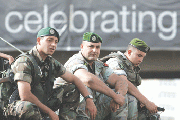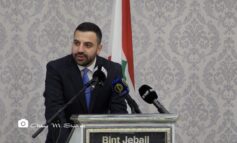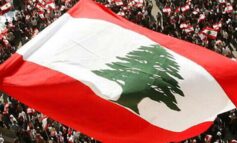
Events in Beirut and other parts of Lebanon continue to move erratically, with simultaneous gestures of political compromise and armed clashes that have left 46 dead in the past week.
The consequences of what has happened in the past week may portend an extraordinary but constructive new development.
If Lebanon shifts from street clashes to the hoped-for political compromise through a renewed national dialogue process, it will have a national unity government whose two factions receive arms, training, funds and political support from both the United States and Iran. Should this happen, an unspoken American-Iranian political condominium in Lebanon could prove to be key to power-sharing and stability in other parts of the region, such as Palestine, Iraq and other hot spots.
The brief, isolated, but intense clashes that occurred threatened a total, Iraq-like collapse of Lebanon, with the Hizbullah-led alliance controlling power in the capital Beirut and other critical areas. The frantic pace of political and street action comprised and clarified four noteworthy developments, whose implications for the rest of the Middle East could be momentous:
1. When the government decided to challenge Hizbullah on May 6 by announcing it was sacking the Shi’a army general in charge of airport security and dismantling Hizbullah’s underground security telecommunications network, Hizbullah saw this as the first serious attempt by the government to try and disarm it. Hizbullah immediately challenged the government, warned it against these decisions and made a show of force to protect its security and telecommunications system. When street clashes started in several parts of Beirut, the Iranian and Syrian-backed Hizbullah-led opposition alliance quickly and roundly asserted its dominance over the U.S. and Saudi-backed government alliance. Put to the test, the new balance of power in Lebanon affirmed itself on the street for the first time in less than 24 hours.
2. All the Lebanese parties repeatedly indicated a preference for political compromise over communal war, but also showed they were prepared to fight if forced to. The persistent negotiations via the mass media included critical agreements on naming the armed forces commander, General Michel Suleiman, as the new president, resuming the national dialogue, forming a government of national unity, and revising the electoral law before holding parliamentary elections next year. Negotiating offers came in sequence from Hizbullah secretary general and Shi’a leader Hassan Nasrallah, Future Movement head and Sunni leader Saad Hariri, Sunni Prime Minister Fouad Siniora, and the Shi’a AMAL movement of Parliament Speaker Nabih Berri, a Hizbullah ally.
3. The newly vulnerable government effectively backed down Saturday and reversed its two decisions, as Hizbullah had demanded. The street balance of power was translated into a new political equation inside Lebanon. Hizbullah and its allies had achieved on the street that which they had been asking for politically: the capacity to veto government decisions that were seen as threatening Hizbullah’s security and resistance activities.
4. By immediately handing over to the armed forces those few buildings and strategic locations that they had taken over in Beirut, Hizbullah and its allies sent the signal that they did not want to rule the entire country, and that they trusted the army as a neutral arbiter between the warring Lebanese factions. Prime Minister Siniora sent the same message when he asked the armed forces and their commander, Suleiman, to decide on the fate of the two contested government security decisions that had sparked Hizbullah’s move into West Beirut. The armed forces emerged as the powerful political arbiter and peace-keeper, effectively forming a fourth branch of government, and the only one that is credible and effective in the eyes of the entire population.

All factions have agreed to get their gunmen off the streets and leave only the army and police as public security guardians.
Now they are expected to follow up quickly by formally naming Suleiman as president (to which they have all agreed already), agreeing on a transitional national unity government of technocrats, and drawing up a new election law. The precise sequence of those events is one of the disputed points that must be agreed upon, but agreement may be easier now that the army has emerged as a pivotal arbiter and political actor.
The new domestic political balance of power in Lebanon will reflect millennia-old indigenous Middle Eastern traditions of different and often quarreling parties that live together peacefully after negotiating power relationships, rather than one party totally defeating and humiliating the other. Lebanon can only exist as a single country if its multi-ethnic and multi-religious population shares power. As the political leaders now seek to do this, they operate in a new context where the strongest group comprises Iranian and Syrian-backed Islamist Shi’a and their junior partners, Christian and Sunni Lebanese allies. They will share power in a national unity government with fellow Lebanese who are friends, allies, dependents and proxies of the United States and Saudi Arabia.
If a new Middle East truly is being born, this may well prove to be its nursery.
Rami G. Khouri is editor-at-large of The Daily Star, and Director of the Issam Fares Institute for Public Policy and International Affairs at the American University of Beirut, in Beirut, Lebanon. © 2008 Rami G. Khouri






Leave a Reply